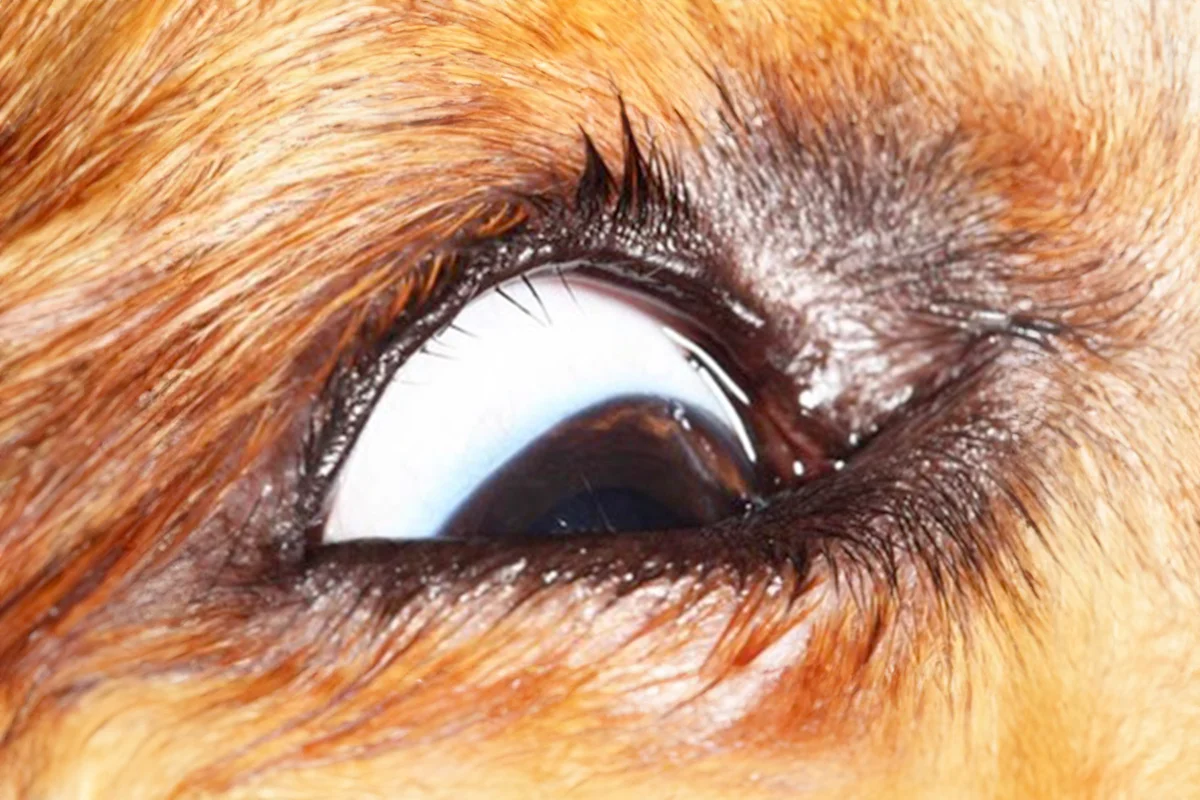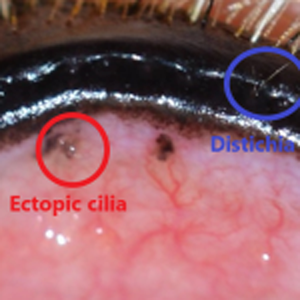Pet Distichia / Ectopic Cilia in Spring, TX
Treat your pet’s distichia and ectopic cilia at North Houston Veterinary Ophthalmology in Spring, TX, for improved eye health and comfort.

Pet Distichia / Ectopic Cilia
Understanding Distichia and Ectopic Cilia in Pets
At North Houston Veterinary Ophthalmology (NHVO), we frequently treat distichia and ectopic cilia in pets. Distichia are eyelashes that grow from an inappropriate location on the eyelid, emerging from the leading edge through tiny gland openings. Ectopic cilia are hairs that originate from the inner eyelid conjunctiva and come into contact with the cornea, causing significant discomfort.

Clinical Signs of Distichia and Ectopic Cilia
Imagine the persistent irritation of having an eyelash stuck in your eye—similar to what pets experience with ectopic cilia and sometimes with distichia. Many pets have distichia, and in some cases, the distichia are not irritating and seem to float in the tear film while in other cases, the distichia cause chronic irritation and ulceration. With ectopic cilia and some distichia, the hairs cause increased tearing and squinting due to their constant contact with the cornea. Pets with these conditions are at a higher risk of developing corneal ulcers, especially with ectopic cilia, which can lead to severe discomfort. Chronic irritation may also result in blood vessels and pigmentation forming on the corneal surface.
Symptoms to Watch For
- Increased Tearing: Pets may have watery eyes more frequently.
- Squinting: Continuous squinting or blinking can indicate discomfort.
- Corneal Ulcers: Look out for signs of eye pain, redness, and possible discharge.
- Chronic Irritation: Persistent irritation can cause noticeable changes in the eye’s appearance.
Causes of Distichia and Ectopic Cilia
These conditions result from abnormal hair follicle development. They may be inherited or occur due to a spontaneous abnormality.
Genetic Factors
Some pets are genetically predisposed to developing distichia and ectopic cilia. Breeds with a higher incidence of these conditions include Shih Tzus, Bulldogs, and Cocker Spaniels. If your pet belongs to one of these breeds, regular eye check-ups are advisable.
Spontaneous Development
In some cases, these conditions may develop spontaneously without a clear genetic link. Regular veterinary check-ups can help detect and manage these issues early.
Treatment Options at North Houston Veterinary Ophthalmology
Permanent removal of the irritating hairs is essential to improve your pet’s comfort and reduce the risk of complications such as corneal ulceration. At North Houston Veterinary Ophthalmology, we offer several treatment options tailored to your pet’s specific needs.
Surgical Excision
The most successful method for removal of ectopic cilia is surgical excision of the hair and the associated hair follicle. This surgical procedure is performed under a specialized surgical microscope. Plucking the hair is only a temporary solution because if the hair follicle remains, the hair will regrow, causing the cycle of corneal irritation and ulceration to continue.
Cryotherapy
Cryotherapy involves freezing the abnormal hair follicles, effectively eliminating them. This method is minimally invasive and can be very effective in preventing hair regrowth.
Thermocautery
Thermocautery uses heat to destroy the abnormal hair follicles. This technique is precise and helps in reducing the likelihood of recurrence.
Aftercare and Monitoring
Post-treatment care is crucial to ensure the best outcome for your pet. At NHVO, we provide detailed aftercare instructions and schedule follow-up visits to monitor your pet’s recovery and address any concerns.
Comprehensive Care for Distichia and Ectopic Cilia
At North Houston Veterinary Ophthalmology, we prioritize the well-being of your pets. Our experienced team is dedicated to providing comprehensive care for conditions like distichia and ectopic cilia. With advanced diagnostic tools and a range of effective treatment options, we ensure your pet receives the best possible care. For more information or to schedule an appointment, please contact us at North Houston Veterinary Ophthalmology.